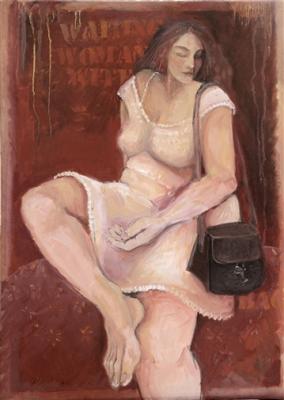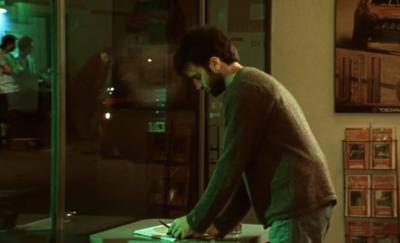
https://www.youtube.com/watch?v=E8czs8v6PuI
…Palabras, palabras en inglés, están llenas de ecos, de recuerdos, de asociaciones. Han estado fuera de casa, en los labios de la gente, en sus casas, en las calles, en los campos, durante tantos siglos. Y es hoy una de las principales dificultades de escribirlas –porque se han almacenado con otros significados, con otros recuerdos, y han contraído tantos famosos matrimonios en el pasado. La espléndida palabra "encarnada", por ejemplo –¿se puede utilizar sin recordar "multitudinarios mares"? En los viejos tiempos, por supuesto, cuando el inglés era un idioma nuevo, los escritores podían inventar nuevas palabras y usarlas. Hoy en día es bastante fácil inventar nuevas palabras –brotan en los labios cada vez que vemos una nueva visión o una sensación nueva– pero no podemos usarlas porque el idioma inglés es viejo. No se puede utilizar una nueva palabra en una lengua antigua debido al hecho muy obvio pero siempre misterioso de que una palabra no es una entidad única e independiente, sino parte de otras palabras. De hecho no es una palabra hasta que es parte de una oración. Las palabras pertenecen al otro, aunque, por supuesto, sólo un gran poeta sabe que la palabra "teñirían" pertenece a "mares". Combinar palabras nuevas con palabras viejas es fatal para la constitución de la oración. Para usar nuevas palabras correctamente tienes que inventar un nuevo idioma; y, aunque sin duda llegaremos a ello, no es por el momento nuestro asunto. Nuestro asunto es ver qué podemos hacer con la vieja Lengua Inglesa como está. ¿Cómo podemos combinar las viejas palabras en nuevos órdenes para que sobrevivan, para que creen belleza, para que pronuncien la verdad? Esa es la pregunta.
Y la persona que podría responder a esa pregunta merece cualquier corona de gloria que el mundo tenga para ofrecer. Piensa lo que significaría si pudieras enseñar, o si pudieras aprender el arte de la escritura. Cada libro, cada periódico que tomaras, diría la verdad o crearía belleza. Pero hay, parece, algún obstáculo en el camino, un obstáculo para la enseñanza de las palabras. Aunque en este momento al menos se hallen cien profesores dando una conferencia sobre la literatura del pasado, al menos mil críticos estén revisando la literatura del presente y cientos y cientos de hombres jóvenes y mujeres se encuentren presentando exámenes en literatura inglesa con el mayor nivel – ¿escribimos mejor, leemos mejor de lo que hemos leído hace cuatrocientos años atrás, cuando éramos no enseñados, no criticados, no pensados? Nuestra moderna literatura georgiana es un parche de la época isabelina. Bueno, ¿entonces dónde echar la culpa? No en nuestros profesores; no en nuestros revisores;no en nuestros escritores. En las palabras. Son las palabras las culpables. Son las más salvajes, más libres, más irresponsables, las más no enseñables de todas las cosas. Por supuesto, pueden atraparse y ordenarse y colocarse en orden alfabético en los diccionarios. Pero las palabras no viven en diccionarios; viven en la mente. Si quieres una prueba de esto, considera cómo a menudo en momentos de emoción cuando más necesitamos las palabras, no encontramos ninguna. Sin embargo, existe el diccionario; están a nuestra disposición más de medio millón de palabras en orden alfabético. ¿Pero podemos usarlas? No, porque no viven en los diccionarios, viven en la mente. Mira una vez más el diccionario. ¿Hay sin duda alguna mentira más espléndida que Antonio y Cleopatra?, ¿algún poema más bello que la Oda a un ruiseñor? novelas que a su lado, Orgullo y prejuicio o David Copperfield son la torpeza cruda de aficionados. Es sólo una cuestión de encontrar las palabras correctas y ponerlas en el orden correcto. Pero no podemos hacerlo porque no viven en diccionarios. Ellas viven en la mente. Y ¿cómo viven en la mente? De manera diversa y extraña, tanto como los seres humanos viven, de acá y allá, se enamoran y aparean. Es cierto que las palabras están mucho menos obligadas por la ceremonia y las convenciones que nosotros. Palabras reales se aparean con plebeyas. Palabras inglesas se casan con palabras francesas, alemanas, indias, negras, si tienen fantasía. De hecho, cuanto menos investiguemos el pasado de nuestra querida madre Inglesa, mejor será para su reputación. Ha ido errante, errante, la hermosa doncella.
Así que establecer leyes para tales incorregibles vagabundas es más que inútil. Algunas reglas insignificantes de la gramática y de la ortografía es toda la restricción que podemos tener con ellas. Todo lo que se puede decir acerca suyo, es como si nos asomáramos sobre el borde de la profunda y oscura caverna donde viven, apenas iluminada de manera irregular: la mente, todo lo que podemos decir de ellas es que parece que les gusta que la gente piense antes de usarlas, y sentir después que han sido usadas, mas no pensar y sentir acerca de ellas, sino de otras cosas. Son muy sensibles, fácilmente toman consciencia de sí mismas. No les gusta que se discuta sobre su pureza o impureza. Si se inaugura una Sociedad para el Inglés Puro, mostrarán su resentimiento inaugurando otra para el Inglés Impuro- de ahí la violencia antinatural del discurso moderno; se trata de una protesta contra los puritanos. Son altamente democráticas, también; creen que una palabra es tan buena como otra; palabras sin educación son tan buenas como las palabras educadas, palabras no cultivadas tan buenas como las cultas, no hay rangos o títulos en su sociedad. Tampoco les gusta ser levantadas sobre la punta de una pluma y examinadas por separado. Cuelgan juntas, en oraciones, párrafos, a veces durante páginas enteras a la vez. Odian ser útiles; odian hacer dinero; odian recibir lecciones en público. En resumen, que odian cualquier cosa que las sellen con un significado o confinen a una actitud, porque su naturaleza es el cambio.
Tal vez ésa es su peculiaridad más llamativa - su necesidad de cambio. Sucede porque la verdad que tratan de atrapar es multifacética, y la vuelven polifacética, parpadea primero de esta manera, luego de esa otra. Así que quieren decir una cosa a una persona, otra cosa a otra persona; son ininteligibles para una generación, y clarísimas para la siguiente. Y es debido a esta complejidad, a este poder que significa ser diferentes cosas para diferentes personas, que sobreviven. Tal vez una razón por la que no tenemos un gran poeta, novelista o un crítico sea hoy que nos negamos a dar a las palabras su libertad. Las fijamos a un significado, un significado de uso, al significado que nos hace coger un tren, al significado que nos hace pasar el examen ...
Traducción: Marcela Chacón Ruiz
…Words, English words, are full of echoes, of memories, of associations. They have been out and about, on people’s lips, in their houses, in the streets, in the fields, for so many centuries. And that is one of the chief difficulties in writing them today – that they are stored with other meanings, with other memories, and they have contracted so many famous marriages in the past. The splendid word "incarnadine," for example – who can use that without remembering "multitudinous seas"? In the old days, of course, when English was a new language, writers could invent new words and use them. Nowadays it is easy enough to invent new words – they spring to the lips whenever we see a new sight or feel a new sensation – but we cannot use them because the English language is old. You cannot use a brand new word in an old language because of the very obvious yet always mysterious fact that a word is not a single and separate entity, but part of other words. Indeed it is not a word until it is part of a sentence. Words belong to each other, although, of course, only a great poet knows that the word "incarnadine" belongs to "multitudinous seas." To combine new words with old words is fatal to the constitution of the sentence. In order to use new words properly you would have to invent a whole new language; and that, though no doubt we shall come to it, is not at the moment our business. Our business is to see what we can do with the old English language as it is. How can we combine the old words in new orders so that they survive, so that they create beauty, so that they tell the truth? That is the question.
And the person who could answer that question would deserve whatever crown of glory the world has to offer. Think what it would mean if you could teach, or if you could learn the art of writing. Why, every book, every newspaper you’d pick up, would tell the truth, or create beauty. But there is, it would appear, some obstacle in the way, some hindrance to the teaching of words. For though at this moment at least a hundred professors are lecturing on the literature of the past, at least a thousand critics are reviewing the literature of the present, and hundreds upon hundreds of young men and women are passing examinations in English literature with the utmost credit, still – do we write better, do we read better than we read and wrote four hundred years ago when we were un-lectured, un-criticized, untaught? Is our modern Georgian literature a patch on the Elizabethan? Well, where then are we to lay the blame? Not on our professors; not on our reviewers; not on our writers; but on words. It is words that are to blame. They are the wildest, freest, most irresponsible, most un-teachable of all things. Of course, you can catch them and sort them and place them in alphabetical order in dictionaries. But words do not live in dictionaries; they live in the mind. If you want proof of this, consider how often in moments of emotion when we most need words we find none. Yet there is the dictionary; there at our disposal are some half-a-million words all in alphabetical order. But can we use them? No, because words do not live in dictionaries, they live in the mind. Look once more at the dictionary. There beyond a doubt lie plays more splendid than Antony and Cleopatra; poems lovelier than the Ode to a Nightingale; novels beside which Pride and Prejudice or David Copperfield are the crude bunglings of amateurs. It is only a question of finding the right words and putting them in the right order. But we cannot do it because they do not live in dictionaries; they live in the mind. And how do they live in the mind? Variously and strangely, much as human beings live, ranging hither and thither, falling in love, and mating together. It is true that they are much less bound by ceremony and convention than we are. Royal words mate with commoners. English words marry French words, German words, Indian words, Negro words, if they have a fancy. Indeed, the less we enquire into the past of our dear Mother English the better it will be for that lady’s reputation. For she has gone a-roving, a-roving fair maid.
Thus to lay down any laws for such irreclaimable vagabonds is worse than useless. A few trifling rules of grammar and spelling is all the constraint we can put on them. All we can say about them, as we peer at them over the edge of that deep, dark and only fitfully illuminated cavern in which they live – the mind – all we can say about them is that they seem to like people to think before they use them, and to feel before they use them, but to think and feel not about them, but about something different. They are highly sensitive, easily made self-conscious. They do not like to have their purity or their impurity discussed. If you start a Society for Pure English, they will show their resentment by starting another for impure English – hence the unnatural violence of much modern speech; it is a protest against the puritans. They are highly democratic, too; they believe that one word is as good as another; uneducated words are as good as educated words, uncultivated words as good as cultivated words, there are no ranks or titles in their society. Nor do they like being lifted out on the point of a pen and examined separately. They hang together, in sentences, paragraphs, sometimes for whole pages at a time. They hate being useful; they hate making money; they hate being lectured about in public. In short, they hate anything that stamps them with one meaning or confines them to one attitude, for it is their nature to change.
Perhaps that is their most striking peculiarity – their need of change. It is because the truth they try to catch is many-sided, and they convey it by being many-sided, flashing first this way, then that. Thus they mean one thing to one person, another thing to another person; they are unintelligible to one generation, plain as a pikestaff to the next. And it is because of this complexity, this power to mean different things to different people, that they survive. Perhaps then one reason why we have no great poet, novelist or critic writing today is that we refuse to allow words their liberty. We pin them down to one meaning, their useful meaning, the meaning which makes us catch the train, the meaning which makes us pass the examination…







